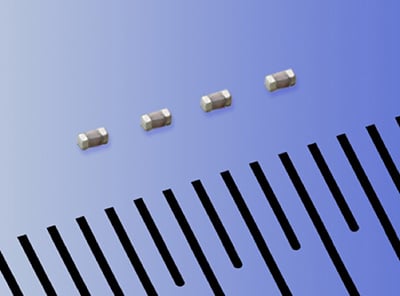source: Kyocera news
December 7, 2017. Ultra-miniature, high-Q devices offer new potential for creating smaller, more functional smartphones, wearables and related equipment
Kyocera Corporation today announced that it has developed new multilayer ceramic capacitors (MLCCs) for mobile device applications in a 008004 case size, among the world’s smallest*1. Measuring just 0.25 x 0.125 x 0.125mm, Kyocera’s new CM01 Series MLCCs reduce space requirements by 60% in surface area and 75% in total volume as compared to conventional products. The new MLCCs are now available worldwide.
Product Overview
| Product name | CM01 Series MLCC | ||||
| Size | 0.25×0.125×0.125mm | ||||
| Characteristics | C0G (EIA) | ||||
| Capacitance | 0.2 to 22pF | ||||
| Tolerance |
|
||||
| Rated voltage | 25Vdc: 0.2 to 9.9pF 16Vdc: 10 to 22pF |
||||
| Production facility | Kagoshima Kokubu Plant |
The trend toward smaller, more highly functional telecommunications equipment has increased component requirements within smartphones, wearables and related devices — creating particular demand for ultra-miniature MLCCs to facilitate greater circuit densities. In response to this demand, Kyocera’s new CM01 Series’ ultra-compact size will help circuit designers create more capable and functional products. The new MLCCs feature tight tolerances on key specifications, with an industry-leading*2 Q-value*3 which is 20% higher than conventional MLCCs*4 to meet the rising demand for highly efficient power amplifier modules. Kyocera will continue to develop innovative products that contribute to an expanding IoT (Internet of Things) society.
Main Features
1. Ultra compact size reduces space requirements
Continuous improvements in Kyocera’s proprietary electrode printing and forming technologies enable the company to reduce these components’ space requirement by 60% in mounting area and 75% in total volume, as compared to the 01005 case size. These ultra-compact MLCCs can thus contribute greatly to the goal of delivering equivalent performance from smaller devices; or, delivering greater performance and functionality without increasing the circuit (or device) size.
2. Tight tolerance with 20% increase in Q-value compared to conventional MLCCs
With demand for ever-greater telecommunication bandwidth and data transfer speeds, improved power efficiency has become crucial. Power amplifier modules require components with tight tolerances on key specifications, such as electrode dimensions, to optimize power use within matching circuits. Kyocera’s new MLCCs accomplish this while reducing energy consumption in ultra-high-speed and high-capacity devices.
*1: Among the world’s smallest for 008004 size MLCCs. Based on research by Kyocera (as of November 2017).
*2: Based on research by Kyocera (as of November 2017).
*3: Q-value: An index to show the degree of energy loss inside a capacitor. A higher value indicates lower energy loss.
*4: When compared to Kyocera’s conventional MLCCs in a 01005 case size.
